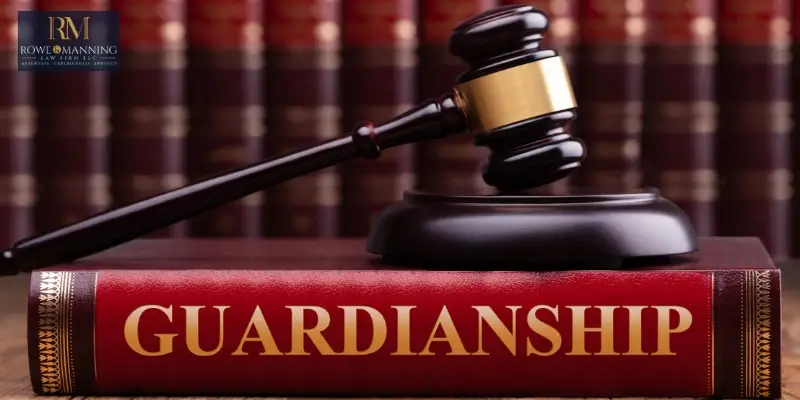Prairieville Guardianship Attorneys
Guardianship law is deeply personal and requires sensitivity and understanding of each family’s unique circumstances. This type of law exists to protect the most vulnerable, so the courts require clear evidence and thorough preparation. Working with a Prairieville guardianship lawyer can provide diligence, knowledge, and advocacy for a positive outcome. If your case involves related family law matters, a experienced Prairieville family lawyer can also offer essential guidance to navigate complex legal challenges.

Creating Innovative Solutions
For more than 15 years, Rowe & Manning Law Firm LLC has been a supporter of families across Louisiana. We are backed by decades of combined experience in areas like family law, insurance defense, and mediation. To see how we’ve successfully helped our clients, explore our case results. We understand the delicate balance of strength and compassion that guardianship cases require. We value delivering personalized service and thoughtful guidance to protect the people you care about most.
Types of Guardianship
Guardianship arrangements in Louisiana vary based on the needs of the ward or the person being taken care of. Temporary guardianships address urgent situations where immediate action is necessary to protect the ward’s well-being. These arrangements are limited in duration, usually lasting until the court holds a formal hearing. Permanent guardianships are long-term arrangements for individuals who likely cannot become fully independent.
There is also a difference between guardianships for minors and adults. For minors, guardianships give proper care and oversight when parents are unable to fulfill their roles. In contrast, guardianships for adults address the needs of individuals with disabilities, the elderly, or those who cannot make their own decisions. Each type of guardianship is tailored to the specific needs of the ward and is guided by the court.
The Guardianship Process in Louisiana
The legal process of establishing guardianship is designed to protect vulnerable individuals and respect their rights and dignity. This means that there are multiple steps and opportunities for review. For more details on Louisiana guardianship in Child in Need of Care cases, see the Guide to Legal Guardianship. The process includes:
- Filing the petition. The process starts with submitting a petition to the district court in the ward’s parish or residence. This document includes detailed medical records, financial records, and personal information about both the proposed guardian and the ward. The person filing also has to explain why less restrictive alternatives have been considered and are insufficient.
- Notification. Everyone involved in the guardianship has to receive formal notice before the hearing takes place. This includes the ward, their family, and anyone who is currently caring for them.
- Evaluation. A court-appointed team usually conducts a thorough evaluation of the ward’s condition. This usually includes a physician’s exam, a psychological assessment, and a report from a social worker. These evaluations review areas of capacity like financial management, healthcare, and daily living.
- Hearing. The court proceeding allows all parties to present relevant evidence and testimony. Medical professionals might be called to explain their findings, family members can express their views, and the proposed ward has the right to contest guardianship. The judge then weighs whether the guardianship is necessary and if it should be full or limited in scope.
- Issuance of order. When guardianship is approved, the court produces a detailed order outlining the guardian’s powers and limitations. This document outlines reporting requirements, defines which decisions require court approval, and establishes the schedule for review. There might be additional requirements and training before the guardian can start their duties.
The process emphasizes oversight and accountability to protect the ward’s interests. Regular reviews and reporting requirements help the arrangement serve its intended purpose. If circumstances change, the arrangement can be modified in the future.
Guardian Responsibilities
A guardian’s primary role is to act in the ward’s interests. For minors, this can include managing their education, healthcare, and their daily living needs. Adult guardians may need to oversee medical decisions, find appropriate housing, and manage financial affairs, including paying bills and keeping assets in order.
Guardians have a responsibility to act transparently and ethically. Louisiana courts require guardians to submit regular reports documenting financial transactions and the ward’s condition so that they can make sure the guardian is meeting expectations. Failure to meet these duties can result in a guardian’s removal from their role as well as other legal consequences. Guardians should also respect the ward’s preferences whenever possible.
The legal process of establishing guardianship is designed to protect vulnerable individuals and respect their rights and dignity. For a broader understanding of guardianship laws and how they may vary, refer to this detailed resource on guardianship statutes.

FAQs About Guardianship in Prairieville,LA
How Do I Get Legal Guardianship in Louisiana?
Obtaining legal guardianship in Louisiana includes filing a petition in the appropriate court. The process starts by showing that the proposed ward cannot manage their own affairs due to age, disability, or incapacity. The court will require evidence, like medical records or professional testimony, to prove the need for guardianship. After filing, a hearing will be held to determine whether guardianship is necessary.
How Long Can Guardianship Last in Louisiana?
Guardianship in Louisiana depends on when the ward reaches a level of independence. For minors, guardianship usually ends when they reach adulthood. For adults, guardianship can be permanent or temporary, depending on the court’s assessment of the ward’s condition. Temporary guardianships are used in emergencies and generally only last until a more comprehensive plan is made.
What Rights and Responsibilities Does a Guardian Have?
The rights and responsibilities a guardian has includes the authority to make decisions for the ward, including matters related to their health, safety, and financial welfare. Responsibilities often include managing the ward’s finances, making medical decisions, securing proper housing, and providing for daily needs. While guardians have broad authority, they have to act in the ward’s interests and in compliance with court orders.
Is There a Difference Between Power of Attorney and Guardianship?
The difference between power of attorney and guardianship in Louisiana mostly involves how they are established and the level of control given to the person in charge. A power of attorney is a voluntary agreement where one person gives another authority to make decisions on their behalf. Guardianship is a court-ordered arrangement for individuals who cannot make decisions for themselves.
Build Your Case on a Strong Foundation
The decision to establish guardianship isn’t easy, but it’s necessary to protect the people we care about most. Guardianship helps families find a solution that prioritizes the well-being of their loved ones. If you are considering guardianship for a loved one, schedule a consultation with Rowe & Manning Law Firm LLC to let us guide you through the process.

